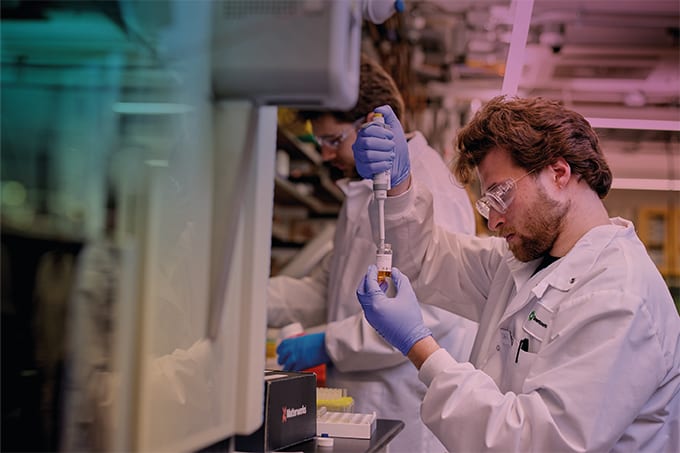
There’s a famous maxim known to staff of the American Chemical Society: if you leave out books at the National Meeting, they will all walk away. Chemists are addicted to learning and knowledge – it’s a lifelong obsession.
When was the last time you learned something new for your job? If you’re working in science, your answer might be a moment ago or an hour ago. Learning is happening everywhere and all the time. In addition, scientists demonstrate a clear belief in the value of structured training, as evidenced by their attendance of technical sessions at conferences, short courses, and continuing education, in droves. These experiences allow scientists to step out of the day-to-day and focus on significantly advancing skills in a particular area, engaging in a deeper learning experience. In recent years, however, significant conditions have emerged that threaten this basic principle of the structure of science. The recession of 2008 changed the landscape of technical training for professionals in the US and Europe. According to Josh Bersin, Principal and Founder of Bersin by Deloitte, the economic recession has impacted training organizations on both sides of the Atlantic, with 11 percent cutbacks experienced by organizations in the US in 2010. “While the cuts were steeper in the US [...] UK organizations are certainly feeling the pinch as well,“ he said (1). Typically, training and travel budgets go to the chopping block early whenever there’s a need for expense reduction. The actual price of the training is not the only issue: time away from the lab can decrease productivity in the short term and travel costs have greatly increased in recent years. Although these additional outlays have a negative impact on the return on investment of any training, good companies know that they must keep their staff fully trained to stay ahead of their competitors. Many industries turned to online delivery of training because it removes the cost of travel and time away from the office. E-learning now represents $56.2 billion, out of an overall $200 billion spent on corporate training, according to Global Industry Analysts (2). But most online learning programs don’t strongly support peer-to-peer networking, which is a highly valued component of in-person training and conference attendance. Another hurdle for online chemistry training was how to provide essential hands-on, interactive lab activities. Meanwhile, there has been an explosion of free or nearly free content. Equipment manufacturers all have YouTube channels, many graduate school labs make instructional videos and there are loads of free webinars and courses on offer. Some organizations, including the American Chemical Society, record a portion of their conference presentations and provide them online after the conference. If you have a need for new knowledge, one approach is to spend all day on Google looking up articles, webinars, videos, and tutorials. But it is precisely this indiscriminate glut of available information that makes it so difficult to discover, evaluate, and utilize these sources as an effective replacement or complement to formal or informal training. At the ACS Department of Professional Education (ProEd) we recognized a clear need for flexible, high-impact training that was cost-efficient and that improved on the offerings available at the time.
In 2010, one of us (SR) was reviewing evaluation data from a recent set of short courses. One comment that really got me thinking was this: “It would be great if we could send in our expectations beforehand and the course materials were designed with that in mind.” All of us have had that feeling – part of the class was very helpful, but you could have done without other segments. When a group of learners has varying backgrounds and levels of expertise, it is tricky for the instructor to provide material that all of them will find useful. Wouldn’t it be great if the same set of learners were moving toward the same goal at the end of the class, but each was receiving only material that they was desired and needed? Truly an innovative idea, and one that our group has developed. “That observation was one of the starting points for us,” says John Miller, Assistant Director of the department of Professional Education (ProEd) at the American Chemical Society. “And there were favorable conditions that we were able to take advantage of. Research showed that our customers were looking for learning that was on-demand and self-paced. But they wanted to be sure they were getting the best content from the best experts. Also, the technology had advanced enough that we could use a very affordable platform to support what we wanted to do.” ProEd has been running courses for chemists since the early 1960s, training many thousands through the years. Live online courses, which were basically online versions of the short courses, and on-demand courses, were introduced over the last decade, offering scientists the chance to get training at their own convenience. With a few years’ experience of these programs under our belt, it was clear that there was still an unmet need. Scientists in our online courses were reviewing recorded portions of lectures after work, on their own time. But they weren’t watching the lectures in order, or even in their entirety: they would watch a few minutes here, a few minutes there; they would skip entire portions. Clearly, the lectures as designed weren’t meeting the needs of all types of scientists that were interested in that topic. There needed to be more flexibility and customization. That’s where new technologies have come in. While database systems that help organizations to manage training have been around for decades, until recently they were designed solely for universities and big companies that undertake large internal training programs. Organizations such as ours that offer training to a disparate group of customers were caught in an endless of cycle of IT development and customization to create systems easy enough to learn within and simple enough for a small staff to operate. Unfortunately, these systems couldn’t change as fast as their customers did. That changed ten years ago. The advancement of open-source learning management systems created a new breed of platforms with much higher flexibility and much lower administration costs. These platforms integrate with social media and use web services to share data with any number of external systems. For us, this was a pivotal development: it lowered the cost and technology barrier and allowed us to develop an entirely new online learning product, called Sci-Mind. Sci-Mind, which was launched in 2012, integrates the best of traditional education, online learning and technology to create a dynamic online environment where individual lesson plans are tailored to each learner’s professional needs and reinforced through their cohort experience.
PHVsPjxsaT5CZWZvcmUgam9pbmluZyBhIFNjaS1NaW5kIGNvaG9ydCwmbmJzcDtlYWNoIGxlYXJu ZXIgY29tcGxldGVzIGEga25vd2xlZGdlJm5ic3A7bWFwcGluZzxiciAvPmV4ZXJjaXNlIGFuZCB3 b3JrcyBvbmUtb24tb25lIHdpdGggYW4gQUNTIGN1cnJpY3VsdW0mbmJzcDtkZXZlbG9wZXIgdG8g cmVjZWl2ZSBhPGJyIC8+Y3VzdG9taXplZCZuYnNwO0xlYXJuaW5nIFNvbHV0aW9uIGFkZHJlc3Np bmcgdGhlaXImbmJzcDtzcGVjaWZpYyBrbm93bGVkZ2UgZ2FwcyBpbiBhJm5ic3A7Z2l2ZW48YnIg Lz5zdWJqZWN0LiZuYnNwOzwvbGk+PGxpPk9uY2UgdGhlIGNvaG9ydCBiZWdpbnMsIGxlYXJuZXJz Jm5ic3A7d29yayBhdCB0aGVpciBvd24gcGFjZSB0byBjb21wbGV0ZSZuYnNwO3RoZWlyIExlYXJu aW5nIFNvbHV0aW9uIOKAkyBhbGwgdGhlJm5ic3A7d2hpbGUgaGF2aW5nIGRpcmVjdCBhY2Nlc3Mg dG8gYSZuYnNwO2RpdmVyc2UgcG9vbCBvZiBleHBlcnRzIGFuZCBwZWVyLXRvLXBlZXIgbGVhcm5p bmcgYWN0aXZpdGllcy48L2xpPjxsaT5Db2hvcnRzIGFyZSBrZXB0IHNtYWxsIChubyBtb3JlJm5i c3A7dGhhbiAxNSBzdHVkZW50cykgYW5kIGhvbWUgaW4gb24gYSZuYnNwO3N1YmplY3QgYXJlYSBp biB3YXlzIHRoYXQgbWFrZSZuYnNwO2xlYXJuaW5nIGVmZmVjdGl2ZSBhbmQgZW5nYWdpbmcuPC9s aT48bGk+VGhyb3VnaG91dCB0aGUgU2NpLU1pbmQmbmJzcDtleHBlcmllbmNlLCBsZWFybmVycyB1 c3VhbGx5IHNwZW5kJm5ic3A7dGhyZWUgdG8gZm91ciBob3VycyBwZXIgd2VlayZuYnNwOwhmb2N1 c2luZyBvbiBhc3NpZ25tZW50cyBhbmQgb25saW5lJm5ic3A7ZXZlbnRzLCBhbmQgaGF2ZSBhIHNp eC13ZWVrIHdpbmRvdyZuYnNwO3RvIGRlY2lkZSBob3cgYW5kIHdoZW4gdGhleSBkbyZuYnNwO3Ro ZWlyIGJlc3QgbGVhcm5pbmcuPC9saT48bGk+VGhlIGNvaG9ydCBzdGF5cyB0b2dldGhlciBmb3Ig c2l4Jm5ic3A7d2Vla3MsIGFuZCBjb25uZWN0cyB0aHJvdWdoIGdyb3VwJm5ic3A7ZGlzY3Vzc2lv bnMsIHBlZXIgcmV2aWV3IG9mIHByb2plY3RzLCZuYnNwO2FuZCBjYXN1YWwgY29udmVyc2F0aW9u LiBBbiBhbHVtbmkmbmJzcDtjb21tdW5pdHkgYWxsb3dzIHRoZW0gdG8gbWFpbnRhaW4mbmJzcDt0 aGF0IGNvbm5lY3Rpb24gdG8gdGhlaXIgcGVlcnMgYW5kJm5ic3A7ZXhwZXJ0cyBsb25nIGFmdGVy IHRoZSBzZXNzaW9uIGNvbmNsdWRlcy4gPC9saT48L3VsPg==
- Customization – the focus is ontopics relevant to the learner
- Flexibility and Accessibility –wherever there is internet access, learners can access Sci-Mind 24-7 to participate or to complete Learning Solution activities
- Cost Effectiveness – time away from the office is minimized and no travel is required
- Innovativeness – the approach makes learning more dynamic and realistic, focusing on customized, individual learning with community reinforcement plus access to interdisciplinary experts
- Helpful progress reports (Learning Report and Manager’s Report) to support job reviews and knowledge expansion, which enhances ROI and on-the-job time efficiencies
- Alumni/networking – part of growing one’s career involves expanding one’s network; Learners become part of ACS ProED alumni network that facilitates career-long professional networking and idea-sharing
“We think of Sci-Mind as an evolution of the kind of training we’ve done successfully for years,” said Miller. “It takes the best features of those products and packages it in a way that works for today’s industrial scientist.”Learn more at www.sci-mind.org
- talentmgt.com/articles/view/uk_corporations_cut_training_budgets_and_staff_gained_new_efficiencies
- www.prweb.com/releases/distance_learning/e_learning/prweb9198652.htm
“I was always a bit on the nerdy side,” says Stephanie Rizk. “My first boyfriend asked me out by writing a program on my graphing calculator.” Stephanie is manager of Sci-Mind, a learning product from the American Chemical Society (ACS), having previously worked in theater management, at non-profit consulting firms, and executive education programs. “Working with scientists is a definite thrill because there is always something more to learn,” she says.

Bryan Tweedy decided on an alternative career in science after his BS degree in Biochemistry. Bryan has worked in publications, industry relations, and technical training within ACS. “I’ve had the opportunity to meet and work with some of the most influential people in the chemical enterprise,” he says.





